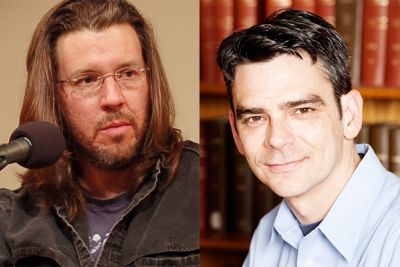
Professor Art Cockfield finds insight in the writings of author David Foster Wallace
For most people, the idea of doing their income taxes invokes fears of hours of drudgery and outright boredom.
However, there is beauty to be found in the details says Art Cockfield, Law’93, a Queen’s professor specializing in tax law, in a new academic paper that takes a closer look at the life and work of award-winning author David Foster Wallace.
In his final book, The Pale King, published posthumously after his suicide, Wallace took an in-depth look at taxes in the United States and the way the majority of society approaches them. He was fascinated by how people deal with tedium in their everyday lives. No surprise then that he was drawn to taxes.
In The Pale King, Cockfield explains, Wallace looked at how earlier generations considered filling out their tax returns as a sort of “moral obligation,” that they were doing their part for the greater community.
The book takes place in the 1980s when taxes were still done by hand, rather than online. However, it addresses contemporary issues.
“The book focuses on tax bureaucrats, people who work at the IRS, but the larger purpose I think is to discuss how most of us struggle with work boredom,” says Dr. Cockfield. “No matter who we are, a big chunk of our lives are taken up by work and this notion that we are confronting tedium throughout the day is very real and one of the great challenges most of us struggle with.”
A huge fan of Wallace’s writing, in particular his award-winning second novel Infinite Jest, Cockfield was named Fulbright Visiting Chair in Policy Studies in 2013 to the University of Texas in Austin, where, it so happened, the collected works of David Foster Wallace are housed.
Cockfield says that he simultaneously read The Pale King while delving into the author’s notes and writings. He learned that Wallace felt there is beauty and great insight to be found in everyday things that we take for granted, particularly at work, he explains in the academic paper.
“So I sifted through his accounting notes and tried to see and understand how he compiled the information for his novel and this great exploration about work boredom and how it affects our interior lives,” says Cockfield. “His themes were don’t get distracted, focus on what you are up to, try to develop a passion for it.”
So, whether it is filling out a tax form or sitting at a desk performing some “drone-like tasks,” if we focus and aren’t distracted we derive something from these experiences.
And while most of us think our taxes reveal nothing more than what we earned and what we owe, Cockfield says they actually provide incredible insight about each taxpayer. “A tax return is a kind of x-ray of an individual, their hopes and dreams, not just their income; their various deductions and charitable contributions and so on,” he says. “It’s fascinating from one perspective.”
Professor Cockfield’s paper, “David Foster Wallace on Tax Policy, How to Be an Adult, and Other Mysteries of the Universe,” is forthcoming in the Pittsburgh Tax Review.
By Andrew Carroll